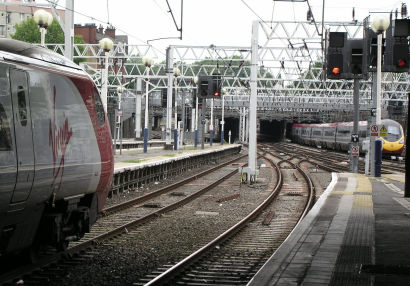IT HAS BEEN confirmed that winning West Coast franchise bidder FirstGroup offered the DfT £700 million more than the runner up Virgin Rail Group, 49 per cent of which is owned by Stagecoach.
The Department for Transport has been accused of 'insanity' by Virgin founder Richard Branson, while Stagecoach warned that the new West Coast contract places more risk on the franchise holder.
Sir Richard reacted to the news by bitterly criticising the DfT's methods of awarding rail franchises, and said it was unlikely that Virgin would bid for any more contracts.
Virgin's partner Stagecoach Group said it was also disappointed at the outcome, and raised further concerns about the viability of the £5.5 billion deal signed by FirstGroup. Stagecoach revealed that the bid for West Coast from Virgin had been worth £4.8 billion at net present value for the core franchise period and £5.8 billion including the potential extension, which would take the 13 year four month contract to 15 years.
In a statement to the Stock Exchange, Stagecoach warned that the new contract posed more risk for the operator, partly because it was longer, but also because the 'cap and collar' revenue protection arrangements have been replaced by a GDP sharing mechanism, in which forecast revenues are linked to the predicted Gross Domestic Product in future years.
The company said it considered that this 'increased the risk borne by the train operating company in respect of revenue falling short of the expectations reflected in the bid'.
Other negative factors highlighted by Stagecoach include more economic uncertainty in the country as a whole, as well as a requirement for more financial guarantees.
The company added: 'Stagecoach and its joint venture partner, Virgin, were both committed to Virgin Rail Group winning the new franchise but only on terms that resulted in an acceptable risk-reward profile and which would add value to the partners' shareholders. We understand that Virgin Rail Group was the Department for Transport's second choice bidder and that the reason it failed to secure the new franchise was because another bidder contracted to pay significantly higher premium payments to the DfT.'
Stagecoach chief executive Sir Brian Souter said: "Virgin Rail Group has revolutionised train travel on the West Coast Main Line. I am bitterly disappointed that Virgin Rail Group has been unsuccessful in its bid for the new West Coast rail franchise. After 15 years, it is difficult to imagine a West Coast rail service without the Virgin brand.
"I would like to thank all those that have been involved in delivering the Virgin vision over that time and all those that contributed to the strong bid for the new franchise. The outcome is a blow to all of those people. Stagecoach will now continue to assess other franchise opportunities and, where appropriate, will work in conjunction with its Virgin partner."
There had been suggestions that hundreds of jobs could be at risk on West Coast, partly because it was predicted that FirstGroup would reduce on-board catering services. This was denied by the company today, when the new managing director of First West Coast, Richard Parry, rejected claims that he was planning to remove the on-board shops and replace them with more seats.
Even so, unions have been sounding warnings about the effect of today's news. Bob Crow of the RMT said: "We are seeking urgent and cast iron guarantees from First West Coast that all our members' jobs are safe and they should be under no illusions that any attack on the staff will be met with a ballot for industrial action."
Meanwhile, TSSA leader Manuel Cortes warned that rail passengers would have to 'pay the price'. He said: "This crazy franchise lottery, where the highest bidder scoops the pot, means that passengers will have to pay inflation busting fares increases on the busiest line in the UK for the next 14 years.
"That is the only way that FirstGroup will be able to pay their annual £400 million premium to George Osborne as well as
rewarding their shareholders with profits."


